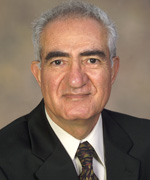ESH Tutorial Session
Target:
Mid-career engineer
Management level
Person who are interested in a cross sectional management
Speaker:
Prof. Farhang Shadman

Regents Professor of Chemical and Environmental Engineering, the University of Arizona
Dr. Shadman is a Regents Professor of Chemical and Environmental Engineering (joint appointment as a Professor of Optical Sciences) at the University of Arizona and the Director of the Engineering Research Center for Environmentally Benign Semiconductor Manufacturing. He was also the founder and Director of Sematech Center for Defect Control in Semiconductor Manufacturing from 1986 to 1996.
Dr. Shadman (PhD from the University of California-Berkeley, 1972) is the author of more than 110 journal articles, 3 book chapters, and 21 patents/invention disclosures. Among his awards are Akira-Inoue Award (2002), Landmark Innovation Award (2000), SRC/Sematech/SIA Excellence in Research Award (1998 and 1992), and Invention Awards (SRC 1991 and 1992). He is a Fellow of American Institute of Chemical Engineers.
SUSTAINABILITY AND ESH ASPECTS OF ADVANCED SEMICONDUCTOR MANUFACTURING
The short course will be given in 3 parts; 40-minutes each, with 10 min for questions and discussion after each segment:
Part 1: General issues related to Environmental, Safety, and Health (ESH) aspects of advanced semiconductor manufacturing; perspective on past, present, and future of ESH challenges and opportunities; technical view of sustainability as it relates to semiconductor manufacturing; examples of technology breakthroughs driven by ESH issues; timing and strategies in incorporating ESH into new technology development and insertion.
Part 2: - Topics related to technologies for reducing the usage of resources (water, energy, and chemicals) in modern fabs; the inter-relationship between the usage of various resources; comparison and optimization of water use reduction, recycle, and reuse; novel technologies for resource use reduction.
Part 3: Specific challenges and opportunities related to manufacturing of nano-electronics; uniqueness of issues expected in moving from micro to nano-scale manufacturing; positive and negative environmental impacts; the latest developments on ESH solutions for current and future nano-manufacturing.




